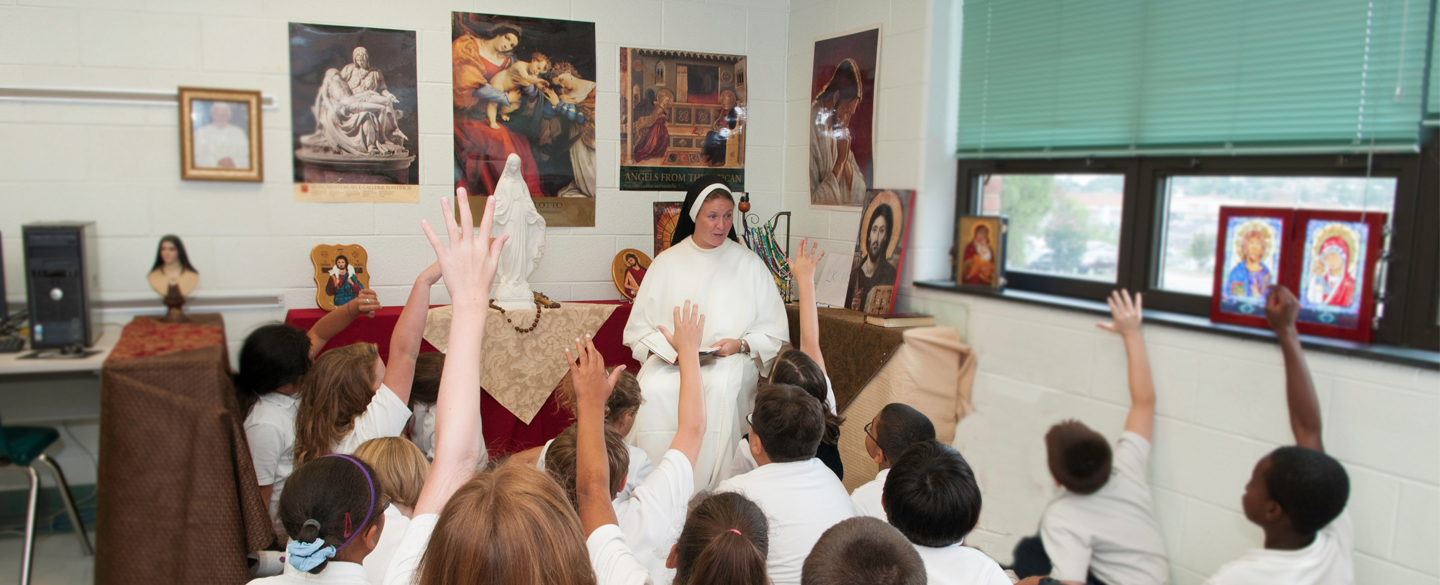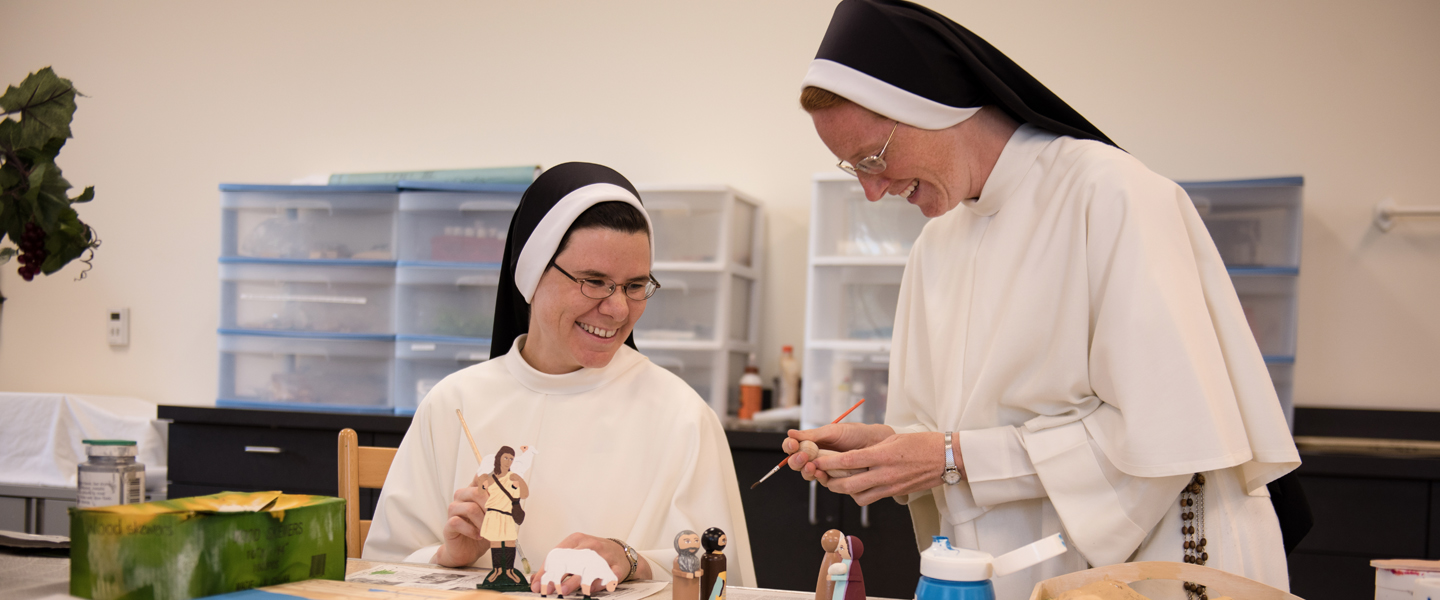
As Dominicans, the sisters prize truth and the development of the intellectual virtues. They earnestly strive, therefore, that their schools be academically superior; the instructors skilled in teaching the fundamental arts and disciplines; the students led to love knowledge and excel in scholastic achievement. In nurturing the intellectual faculties, the instructors develop a capacity for sound judgment and introduce the pupils to the cultural heritage bequeathed by former generations. (Constitutions of the Congregation)

While every school in which our sisters teach has its own distinctive history and culture, the presence of Dominican religious brings a consistent and unique element to each of our schools. Four particular features mark education in the Dominican tradition.
When the Dominican Order was founded in 1216, there was a significant need in the Church for educated religious who were active and mobile. St. Dominic built the Order upon four elements which our sisters bring to the schools in which they serve: preaching, study, prayer, and community. While the size of the student body and the specific curriculum vary with each school, commitment to a strong Catholic identity imbued with the Dominican spirit remains consistent.
The purpose for which St. Dominic founded his Order was that of preaching and the salvation of souls, an aspiration our sisters embrace as well. The light of faith is at the heart of who we are, what we do, and how we do it. Planting the seeds of faith in our students’ souls has ramifications far beyond the years during which they attend our schools. Those seeds are meant to bear fruit in eternity.
Spreading the Gospel Message: Preaching
Eight centuries after the founding of the Order, we continue to exercise St. Dominic’s ideal of preaching. In our schools, our preaching takes the form of teaching. Daily lesson plans and activities engage and inform the minds and hearts of our students. Our vocation as educators, though, is not limited to helping students develop various skills. It first involves assisting them in acquiring knowledge of the Truth, which has its being in God. Students deepen their knowledge the Creator and His creation, especially the human person made in His image. Then, from the knowledge of these foundational truths, other branches of knowledge and learning are formed and deepened.
This mission to preach and teach is also practiced through the witness to truth and love in our own lives. The sisters and lay faculty in our schools strive to teach through their active witness, in order to help students most effectively acquire knowledge of the One who is the source of all truth and life. Strikingly, Pope Paul VI wrote in Evangelii Nuntiandi that “modern man listens more willingly to witnesses than to teachers, and if he does listen to teachers, it is because they are witnesses.” There is power in the love of a teacher who influences his or her students by a deep faith and sincere concern for each student.
These forms of preaching and teaching seek to introduce students to all that is good, true, and beautiful. We strive to open the eyes of our students to see beyond appearances to greater realities and true happiness. Our students will face many obstacles in the course of their lives. The true teacher helps them learn to accept each challenge and complete each task successfully. In the end, however, the truth that encompasses all others is summed up in the First Letter of St. John: “God is love” (1 John 4:8). Here we will find not only the answer, not only to the question of “who is God,” but also the key to our own identity, purpose, and destiny. Created in the image of God, we ourselves are made to love, both in giving of ourselves now, and in communion with God for all eternity. Conviction about this truth will impel our students to go out in service to others. This Dominican tradition encourages students to contemplate the things of God in the classroom and to share the fruits of their studies and their prayer with others through a life of service and faith in the world.
Love of Truth: Study
Veritas, Truth, is one of the mottos of the Dominican Order. Truth, though varied in its expression, is one, for it has its source in God, the First Truth. In order to know this Truth and put it into effect in our lives, study is necessary.
Young people are entrusted to us for a significant period of time in their lives. Our goal is to educate them in what will foster growth and maturity, helping them to acquire the skills necessary to become independent thinkers and to gain a love for all that is truly human. Learning about the faith is critical in this journey. Yet, this study of the faith cannot end with books. It must be transferred from the classroom into daily life and manifest itself through a profound respect for every human person.
Our sisters themselves highly value study. We are educated and deeply prepared to teach. Further, in keeping with our Dominican charism, we continue our personal and professional studies throughout our lives in order to know more fully the One whom we preach and teach in the classroom.
Formation in Faith: Prayer
Dominican life is steeped in liturgical and personal prayer, as is the life of our students. Each day not only begins and ends in prayer, but students are taught what it means to pray and how to pray. Time is set aside each day for prayer.
The sacraments are made available to our students as a means to holiness. At the heart of all Dominican life is the Eucharist, celebrated and received in the Holy Sacrifice of the Mass. Students are also enriched by regular opportunities to receive the Sacrament of Penance and to develop their lives of personal and communal prayer. Devotion to Christ, to the Blessed Virgin Mary and to the saints is fostered daily. Students are also taught a love and respect for the Church and her ministers.
United in Mission: Community
The charism of joy permeates Dominican life, and thus living a joyful community life is essential in a Dominican family. While this fraternal unity is clearly visible among the sisters, it is also extended to those with whom we work and to the students and families whom we serve. Our schools provide numerous opportunities for the building up of community in ways that are spiritual, social, and service oriented.
The Dominican tradition is rooted in prayer, supported in community, committed to truth, and united in love. It is a formula that is ancient and yet ever new.


 Back
Back